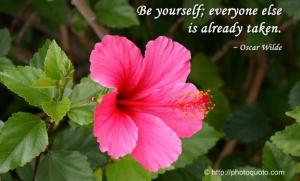In her book The Gifts of Imperfection, Ph.D. Brené Brown presents the results of her research about wholehearted living, that means, persons who live amazing and inspiring lives, people who live and love with their whole heart. 
She writes: “cultivating a wholehearted life is not like trying to reach a destination. Its like walking toward a star in the sky. We really never arrive, but we certainly know we’re heading in the right direction”.
She also presents 10 guideposts or habits that are needed as we strive to live in this way.
1) Cultivating Authenticity.
Authenticity is the daily practice of letting go of who we think we’re supposed to be and embracing who we are.
2) Cultivating Self Compassion. Letting go Perfectionism.
Perfectionism is the belief that if we live perfect, look perfect and act perfect we will avoid the pain of blame and judgment. Is trying to earn approval and acceptance for what we accomplish, and leads to self blame: “it’s my fault”, “I’m not good enough”.
3) Cultivating a Resilient Spirit. Letting go Numbing and Powerlessness.
People that have the ability to overcome adversity recognize the connection that we have with one another, set realistic goals, know how to get them and believe that they can do it.
4) Cultivating Gratitude and Joy. Letting go Scarcity and Fear of Dark.
We are afraid to lose what we love the most, and we hate that there are no guarantees. We think that by not being grateful or feeling joy will make it hurt less. But joy happens when we recognize how good things really are.
5) Cultivating Intuition and Trusting Faith.
Most of us are not very good at not knowing. We like sure things and guarantees so much that we don’t pat attention to intuition. When we start polling people, is because we don’t trust our own knowing: “What would you do …?”. Faith is believing in what we cannot see.
6) Cultivating Creativity. Letting go Comparison.
What we bring to the world is completely original and cannot be compared, and without comparison concepts like ahead or behind, best or worse, lose their meaning.
7) Cultivating Play and Rest. Letting go of Exhaustion as a Status Symbol, and Productivity and Self-worth.
We usually think that we’re too busy to play and waste time fooling around, we think that accomplishments will bring joy and meaning, but play can bring excitement and newness to our job and life.
8) Cultivating Calm and Stillness. Letting go Anxiety as a Lifestyle.
The people interviewed weren’t anxiety free or anxiety averse, they cultivate calm and stillness making these practices the norm. They bring perspective to complicated situations.
We can give ourselves permission to say; “I’m not sure, I need to think about this some more”. We might not even have all the information to make a decision yet.
9) Cultivating Meaningful Work. Letting go Self-doubt and Supposed to.
Creating meaningful work takes a tremendous amount of commitment, because in many cases the meaningful work is not what pays the bills. Meaning is unique to each one of us. Overcoming self-doubt is all about believing we’re enough and letting go of what the world says we’re supposed to be.
10) Cultivating Laughter, Song and Dance. Letting go of Being Cool and Always in Control.
Laughter, song and dance create emotional and spiritual connection. We want to be able to control what other people think about us so that we can feel good enough, but when we don’t give ourselves permission to be free, we rarely tolerate freedom in others.
I really enjoyed reading this book and I’m trying to practice living a wholehearted life. I hope it gives you some inspiration too.
I think the bottom line of being joyful is to follow the path you know deep in your heart is the one you are supposed to.

